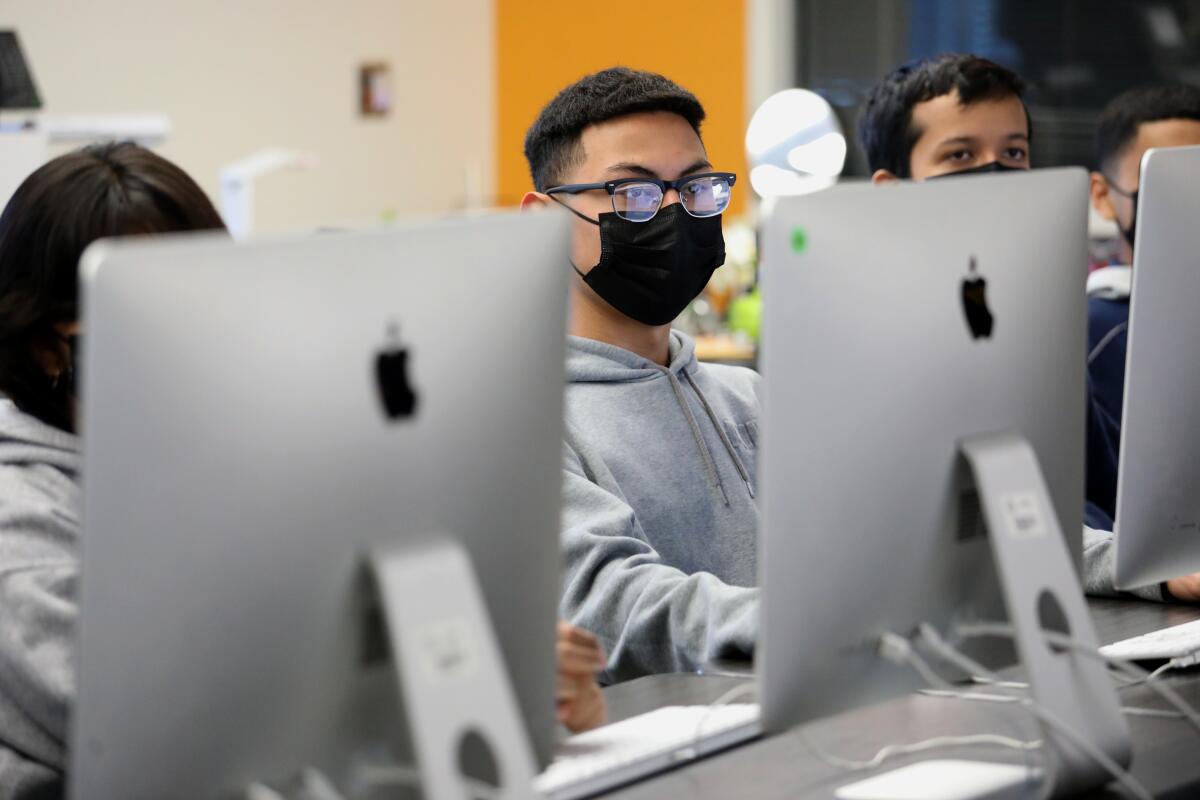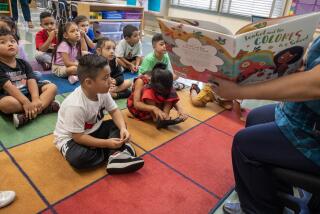73% of voters in L.A. Unified do not believe every neighborhood has a good school, poll says

Seven in 10 voters do not believe that every neighborhood in Los Angeles Unified School District has a good school — and an even higher number believes that a digital divide is holding back students from access to full educational opportunity.
In the poll of likely voters, commissioned by the nonprofit Great Public Schools Now, 73% said no when asked: “Today, do you think that every neighborhood in Los Angeles has a good K-12 school, or not?” Fourteen percent did not know or declined to answer; 12% said yes.
When asked about access to technology for education, 78% said they agreed with this statement: “There is a ‘digital divide’ in Los Angeles — families in underserved communities often pay more for the internet and/or have poor quality internet access, all of which puts their children at a disadvantage at school.”
The responses underscore feelings among the public that an equitable learning opportunity remains unavailable to all students — and that those with the least continue to face the greatest burden.
“Voters from all demographic and political backgrounds express serious doubts about the quality of education in Los Angeles,” stated a research memo that accompanied the survey.
In the poll, 30% gave positive ratings to the quality of education in L.A. Unified. And 58% believed that the quality of K-12 education in L.A. Unified is worse than before the pandemic.
The findings are similar to those from a recent poll that was a collaboration between The Times and the UC Berkeley Institute of Governmental Studies. It asked voters to give schools a letter-grade rating from A to F — and found that voters gave schools worse marks than a decade ago, with the pandemic a potential contributing factor.
The Times poll provided a snapshot of attitudes toward L.A. Unified through a sample of voters from the city of Los Angeles. The new poll’s L.A. Unified sample extends to areas beyond Los Angeles’ city limits, including West Hollywood, Gardena, San Fernando, Carson and the cities of Southeast L.A. County.
Perceptions about the digital divide were not surprising in light of previous interactions between the nonprofit and community members, said Ana Teresa Dahan, the group’s senior director for policy, advocacy and communications
Technology was an academic lifeline for students when campuses were closed for more than a year during the pandemic. And yet the hot spots provided to students for internet access were a “band aid” at best, Dahan said.
“It wasn’t a reliable and sustainable response to the need,” she said. “Hot spots have data caps, drop off, low speeds and in big areas of L.A. County the cellphone connectivity isn’t strong enough for reliable internet access through a hot spot.
“The poll tells us that there is a need for a broader systemic solution.”
The poll also asked voters about whether “the mayor of Los Angeles should be held accountable for making sure that all children in Los Angeles can go to a good school.” To this, 77% said yes. The poll also asked whether the next mayor should be “more active” on education; 59% said yes.
Unlike Chicago and New York City, the L.A. mayor has no direct authority over schools — largely because of the state Constitution but also the lack of contiguous boundaries between the city and school district.
Ana Ponce, executive director of Great Public Schools Now, said candidates should get the message that education is a voter priority.
“This isn’t reflective of the quality or state of our public schools but rather it reflects how voters believe education can contribute to the success of our city,” Ponce said. “We see this as a major opportunity for the next mayor.”
The survey was conducted Feb. 14 through 25, among a representative sample of 602 likely voters. The estimated margin of error is plus or minus 4 percentage points. The study was conducted via phone interviews in English and Spanish.
More to Read
Sign up for Essential California
The most important California stories and recommendations in your inbox every morning.
You may occasionally receive promotional content from the Los Angeles Times.











